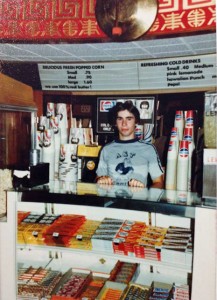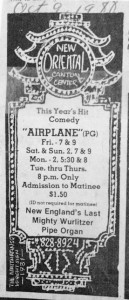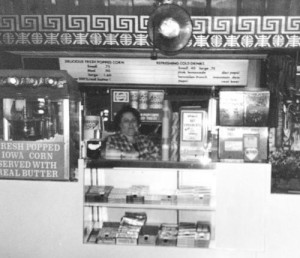True Tales from Canton’s Past: The Last Picture Show
By George T. ComeauThe following is an excerpt from “The Last Picture Show,” the latest installment of True Tales from Canton’s Past by local historian George T. Comeau.
Marion Nay sits in the kitchen of the house she grew up in on Tolman Street. Her eyes sparkle as she brings out several spiral notebooks that she has kept for over 30 years. Along with the notebooks are dozens of scrapbook three-ring binders that she has lovingly kept throughout her life. There is history in this kitchen, and a spunky determination to tell a story.
The way Marion tells it, an advertisement appeared in the local paper searching for someone to help out at a new movie theatre in downtown Canton. It was around 1978 and she applied for the job. “I was hired on the spot,” she said. “It was exciting to be a part of it all.”
This was the new Oriental Theatre, the wonderful and magical brainchild of Fred McLennan.
McLennan is a curious guy. Quite literally, this man is a walking, talking encyclopedia of Boston theatre history. A phone call with McLennan can last for hours and range from radio history to theatrical and political history. It was McLennan who opened and ran many of the movie houses in the greater Boston area.
“For more than 40 years I have been in the movie business,” he said. “I ran the Showcase Cinemas in Dedham and Revere, as well as being the archivist at what is now the Wang Center.”
There is pride in his voice as he commands a vital part of New England’s love affair with the experience of movies.
And if it were not for a pipe organ, there would not have been an Oriental Theatre in Canton or a job for Marion Nay.
“In the early 80s I took a motorcycle trip that ranged from Nova Scotia across the United States with a mission of visiting pizza shops that had installed Wurlitzer organs,” explained McLennan. The mighty Wurlitzer figures heavily in this story. It seems that organs had a second life after movie houses, being installed in pizza joints to entertain diners for about the 20 minutes it took to eat a pizza. McLennan explained that it was all about entertainment.
It was a small church in Saulnierville, Nova Scotia (coincidently the same town that this author’s family hails from) that McLennan found the original church organ that once played in the Dedham Community Theatre. McLennan bought it with plans to open up his very own pizza palace at the Dedham Mall.
“At the time the Flatley Company was developing the mall and thought it might fit better at the Tri-Town Mall at Cobb’s Corner,” he said.
A trip to Canton was in order, and surveying the businesses at Cobb’s Corner, McLennan knew he could not compete with Goodies Deli. A pizza joint would not work.
Driving up Washington Street, McLennan spied the marquee of the once proud Strand Theatre. Canton’s movie house was shuttered and dilapidated. The Blizzard of ’78 had destroyed the roof and, quite literally, mushrooms were growing on the carpets. Where others saw destruction, McLennan saw the future home of his mighty Wurlitzer organ.
The ghost of a theatre in 1978 was once an expansive social and entertainment fixture. Originally known as the Orpheum and built in 1918, this would later become the Strand, and its relevance rose and fell with Hollywood business models. After silent movies fell away, the theater was turned into a roller-skating rink and a miniature golf course. Boxing matches, minstrel shows and local parties all used the Orpheum space. With the rise of “talkies,” the place reopened with the 1956 hit “Anything Goes” starring Bing Crosby and Ethel Merman. The Strand, complete with Technicolor, was a hit.
There are many kitchens that still boast beautiful Depression glass and flow-blue china — courtesy of “dish night” at the Strand. Over time, and with the rise of television, the local movie-house gave way to the megaplex, where you had a choice of films. Canton’s small 600-seat theatre closed.
McLennan saw opportunity and made a deal with the landlady who owned the cleaners next door. “I approached Mrs. Peterson and shared my idea to reopen up the theatre,” he said.
By the sound of it, she scratched her head, and soon acquiesced. “I was going to call it the Last Picture Show and run newsreels, cartoons, and have a Saturday matinee — candy on the cheap and a buck for the popcorn,” McLennan said. “I brought in Justin Freed as my booker.”
Choosing the right movies was critical, and associating with Freed was key. Freed is a lion in Boston movie history. He started working as programmer and manager for the Kenmore Square Cinema in 1965. He was co-programmer at the Orson Welles Cinema in Cambridge from 1969 to 1972. Then he bought the Park Square Cinema in 1972 and the Kenmore two years later. It was Freed who brought the midnight movie to Boston and began scheduling what would become such revival-house standbys as “Bringing Up Baby” and the Astaire-Rogers pictures.
McLennan also decided that key to the new Canton theatre would be the experience. Setting out to emulate the atmospheric theatres of the early 20th century, a collection of movie-house memorabilia was pressed into service — painted ceilings, murals, stars, clouds and even the moon, and of course the mighty Wurlitzer.
The Canton Oriental Theatre that opened in 1978 with 300 seats was billed as a “non-cinema,” suggesting an alternative to big multi-screen conglomerate theatres. McLennan had purchased many of the features of the original Oriental Theatre in Mattapan. The seats came from the Egyptian in Brighton and the projectors came from the Seville in East Boston. This was a totally recycled museum of theatre. McLennan painted the ceiling cobalt blue, installed stars, cranked up a “magic cloud” machine, and opened the week before Christmas with Roman Polanski’s “Chinatown” starring Jack Nicholson and Faye Dunaway. Twelve people came to see the show.
Meanwhile, McLennan had a management style that was laser focused, and perhaps brusque to say the least. The philosophy: “Make it an experience, make it clean, make it entertaining, and the patrons will keep coming back. People feel quality.”
And the key to McLennan’s venture was Marion Nay, who gave execution to McLennan’s vision. Today, she has kept every scrap of paper from her work at the Oriental. In the days before email, the boss wrote out his edicts on paper towels — literally, dozens of paper towels directed the day-to-day operation. The notes are to the point: “See if you can replace the seat bottom on the seat with the paper towel on it (center section 7th row down). There should be a new red leather spare around.”
Marion looks wistfully back on her time at the theatre: “I got very involved, starting right away, buying cleaning supplies at Chandler’s Hardware — a new mop, Lestoil and Comet. Everything was washed and cleaned every day.”
It could not have been the money; by estimating the pay stubs, which she still has, the pay was less than $4 an hour. Nay also was in charge of buying the “real” butter for the fresh popped Iowa popcorn. “We went up to the C&M Market and would buy 20 pounds of butter every week or so,” she said. Apparently the popcorn was so good that many Canton families stopped by on Monday Night Football games just to pick up the hot buttery goodness to serve at home. At $1 a bag, it was a deal.
The Oriental Theatre closed in 1983. McLennan knows how it ended. “The last summer we were running, the federal government took away the film credits and production was cut in half,” he said. “Dedham, Norwood, Foxboro all got out. Cable television came into Canton … the landlady, Mrs. Peterson, passed away. There was the hostage crisis in Iran, and a bit of a depression fell across the country.”
Marion was sad the day she was told the movies would end, but a new part of her life was about to begin.
For the past several years, Marion has been the caretaker for her husband, Peter, who was diagnosed with MS when he was 47 and forced to retire. Today he is totally incapacitated and is cared for by his wife in the home she grew up in. In a wheelchair, Peter remembers how coincidently he worked at the Dedham Theatre as a young man, and how his mother worked there for over 25 years. Photos from the binders spill out, and the Nay children’s faces beam behind the candy counter. Jimmy, Peter, and Carl all worked under the watchful eyes of their mother at the Oriental.
“On Golden Pond” is the one film that remains Marion’s favorite of all time. Roger Ebert wrote of the movie, “I could believe in its major characters and their relationships, and in the things they felt for one another … watching the movie, I felt I was witnessing something rare and valuable.”
And sitting with Marion and Peter in their kitchen, I understood what sparked Ebert’s comments: love, aging and commitment. It all becomes clear — against a backdrop of community, family, and the old-fashioned picture show.
Short URL: https://www.thecantoncitizen.com/?p=24162













